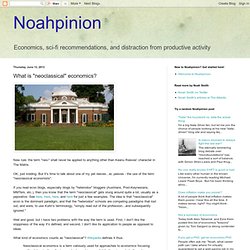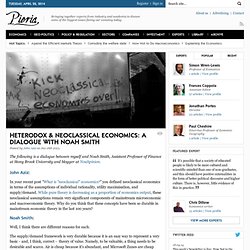

What is "neoclassical" economics? New rule: the term "neo-" shall never be applied to anything other than Keanu Reeves' character in The Matrix.

OK, just kidding. But it's time to talk about one of my pet reeves...er, peeves - the use of the term "neoclassical economists". If you read econ blogs, especially blogs by "heterodox" bloggers (Austrians, Post-Keynesians, MMTers, etc.), then you know that the term "neoclassical" gets slung around quite a lot, usually as a pejorative. See here, here, here, and here for just a few examples. The idea is that "neoclassical" econ is the dominant paradigm, and that the "heterodox" schools are competing paradigms that lost out, and were, to use Kuhn's terminology, "simply read out of the profession...and subsequently ignored. " Heterodox & Neoclassical Economics: A Dialogue with Noah Smith. The following is a dialogue between myself and Noah Smith, Assistant Professor of Finance at Stony Brook University and blogger at Noahpinion.

John Aziz: In your recent post "What is "neoclassical" economics? " you defined neoclassical economics in terms of the assumptions of individual rationality, utility maximisation, and supply/demand. While pure theory is decreasing as a proportion of economics output, these neoclassical assumptions remain very significant components of mainstream microeconomic and macroeconomic theory. Why do you think that these concepts have been so durable in mainstream economic theory in the last 100 years?
Neoclassical Economics as a most peculiar failure.docx. Chicago Economics.